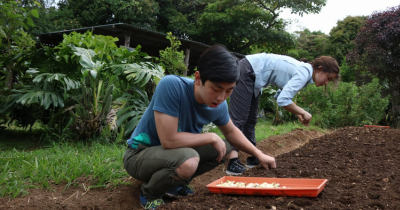Sustainable Travel
Study abroad raises many important sustainability considerations. In addition to the climate impacts of air travel, GLO encourages students to critically examine their impact on the host community and natural environment while abroad with attention to social, economic and environmental sustainability.
Understanding Your Impact
Learn strategies to navigate cultural differences while practicing sustainable habits abroad, helping you make a positive impact in your new environment and host community. The way you engage with your host community shapes both your experience and the community itself. Cultural exchange should reach in both directions—toward people and structures. Your presence as a visitor can have lasting effects, both positive and negative.
Making a Sustainable Impact
Environmental Responsibility

Your choices matter. Consider these sustainable practices and reflect on your impact:
- Understand your carbon impact. Calculate the carbon footprint of your travel here.
- Airplanes produce massive amounts of ozone-depleting carbon dioxide. Consider offsetting the carbon emissions produced through air travel: Sustainable Travel, TerraPass, CarbonFund (ClimeCo).
- Consider alternatives or complements to carbon offsets by committing to carbon onsetting initiatives. One of GLO’s partners in Ecuador has an emerging sustainability initiative you can explore here.
- Practice slow travel. Cconsider alternative transportation options, such as walking, biking, and public transportation. Commit to staying local while abroad. If you do travel regionally, take the bus or train instead of flying. Always remember to research safety concerns related to these different modes of travel in your host country.
- Use a bike. Consider renting a bike to run errands or explore. Over 700 cities around the world now offer bike-sharing programs. Use this bike share map to discover opportunities near you.
Ethical Considerations

Your presence impacts the local community. Consider your daily habits and how you can make a positive contribution.
- Be mindful of your behaviors, habits, consumption and resource use and their impact on others.
- Demonstrate self awareness about identity and culture. Think critically about any negative and/or positive stereotypes you are bringing with you about the host culture.
- Practice cultural humility by learning from and demonstrating respect for diverse forms of expertise, perspectives, as well as the lived experiences of others.
- Practice culturally sensitive photography (e.g. always ask first). Take special care when taking photos of kids and other vulnerable populations. Do those in your photos know where and how you plan to share them?
- Be present and open-minded. Observe, listen, and inquire rather than criticize, rationalize or withdraw.
- Stay flexible, thoughtful and adaptive. Demonstrate patience and resiliency in new situations.
Economic Choices

- Shop at local markets. Support locally-owned businesses and restaurants.
- Track exchange rates using OANDA Currency Converter to understand local costs.
- Be mindful of how your spending might affect local prices.
- Consider if your purchases are taking resources away from locals.
Community Engagement

- Spend time exploring and deeply engaging with the host community before venturing further afield.
- At a minimum: learn basic phrases in the local language, research basic history and local events.
- Participate in community events when invited.
- Seek to learn from local residents rather than just observe.
- Ask permission before taking photos of people.
- Respect local customs and traditions.
Resources and Tools
Sustainability Resources
Go Beyond
- Johnson, M. (2009). Post-reciprocity: In defense of the "post" perspective. Frontiers: The Interdisciplinary Journal of Study Abroad, 18, 181-186.
- McLaren, D. (2006). Rethinking tourism and ecotravel. Bloomfield, CT: Kumarian Press.
- Potts, R. (2008). A slight rant about the rhetoric of "ethical travel." Retrieved from Vagabonding.



